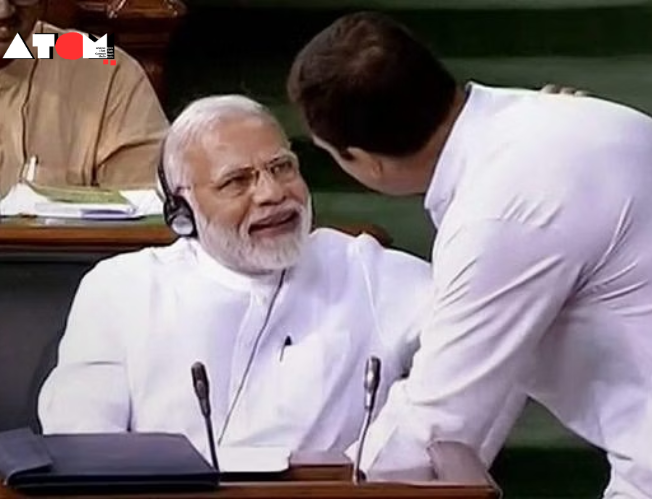With Rahul Gandhi taking over as Leader of the Opposition in the Lok Sabha, Indian politics have taken a decisive turn, paving the way for a direct and heightened political competition between him and Prime Minister Narendra Modi. This change is a critical turning point in the way Indian democracy is developing, as Rahul’s Congress party has become the main rival to the BJP-led National Democratic Alliance (NDA).
Rahul Gandhi’s Political Ascension
Rahul Gandhi’s political career has been extensively discussed and observed. Rahul has progressively established himself as a significant figure in the Congress party and the larger Indian political scene, despite early criticisms that called into doubt his capacity for leadership. In addition to being a personal accomplishment, his recent promotion as Leader of the Opposition reflects calculated political moves made by the Congress to strengthen its standing as a serious rival to the BJP in power.
Raul Gandhi, who was born into the Nehru-Gandhi political family, first became involved in politics in 2004 when he won the Lok Sabha election from Amethi, the traditional home of the Gandhi family in Uttar Pradesh. He has engaged in multiple political contests and leadership challenges throughout the years, with differing degrees of success. But still.
The 2024 Electoral Surge
Under Rahul’s leadership, the Congress party saw a notable comeback in the 2024 elections, almost tripling its number of seats from 52 in 2019 to 99 seats. Rahul’s electoral success enhanced his reputation inside the party and established him as the de facto head of the opposition group in the Lok Sabha. The Congress’s stronger performance was interpreted as a clear threat to the BJP’s stronghold over Indian politics and as a vote of confidence in Rahul’s leadership.
Symbolic Gestures and Political Realities
In the midst of the frequently heated discussions and electoral contests, Narendra Modi and Rahul Gandhi’s symbolic handshake during Om Birla’s election as the Speaker of the Lok Sabha was a rare instance of political decorum. It was an acknowledgement of Rahul’s increasing power and the Congress party’s position as the main opposition force in the present political environment.
Rahul Gandhi now enjoys a constitutional role as Leader of the Opposition, which requires active participation in decision-making processes, oversight of parliamentary proceedings, and close examination of government programmes. He receives important benefits from this post, including cabinet rank equivalent status, and he also has the ability to influence the opposition’s political narrative and agenda.
Challenges and Opportunities Ahead
With Rahul Gandhi taking over as the opposition’s leader, discussions, legislative conflicts, and policy criticisms are expected to intensify in Indian politics. With the Congress party expected to sharpen its criticism of government acts and policies, his stint as Leader of the Opposition is predicted to reshape the parameters of parliamentary democracy.
In addition, talks concerning the opposition alliance’s future course have been triggered by Rahul’s promotion, especially in light of coalition politics and election tactics. Rahul Gandhi must simultaneously bring divergent political forces together and preserve the ideological cohesion of the opposition alliance while navigating the complexity of coalition dynamics and regional desires.
Impact on Governance and Public Discourse
Rahul Gandhi’s rise to prominence as a strong opposition figure has larger ramifications for Indian politics and public opinion. His criticisms of public policies, support of social justice, and focus on inclusive development are anticipated to find resonance with a diverse audience that is becoming more outspoken in its concerns about social justice, economic inequality, and democratic liberties.
Rahul’s leadership style also represents a contemporary approach to public involvement and political mobilisation, as evidenced by his social media connections, youth outreach initiatives, and grassroots engagements. With this strategy, he not only aligns himself with the goals of a youthful India but also establishes himself as a forward-thinking leader who can tackle the problems the country has today.
The findings
In conclusion, Rahul Gandhi’s appointment to the position of Leader of the Opposition signifies a turning point in Indian politics since it represents the revival of the Congress party and a sharpening of his battle with Prime Minister Narendra Modi. Rahul Gandhi’s leadership will be carefully watched as he takes on his new post to see how it affects parliamentary dynamics, opposition cohesion, and electoral tactics in the run-up to the next general elections.
The difference between Rahul’s Congress and Modi’s BJP will influence how India’s democratic accountability, policy-making, and governance narratives are shaped as the country’s political landscape develops. For the most recent updates, observations, and analysis on this developing political drama, follow Atom News.
Read more: Marketing News, Advertising News, PR and Finance News, Digital News





